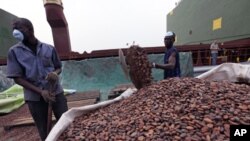Ivory Coast's incumbent government says there will be no disruption to cocoa production, despite calls by the internationally recognized winner of November's election for a month-long ban on cocoa exports.
Even though much of Ivory Coast's current cocoa harvest has been sold, any threat to production in the world's largest grower has a global impact.
Cocoa prices spiked to near 30-year highs following the export ban announced by the U.N.-certified winner of the vote, former Prime Minister Alassane Ouattara.
The U.S. agricultural firm Cargill, which usually buys about 15 percent of Ivorian beans, is suspending purchases in keeping with the ban. International cocoa dealers say the country's political crisis has created a very testing environment.
The incumbent government of Laurent Gbagbo says Mr. Ouattara has no authority over cocoa exports and his call for a ban will not affect production. In a meeting with cocoa dealers, the president of Ivory Coast's cocoa body CGFCC, Gilbert Ano, said there will be no disruptions.
Ano says Ivory Coast has a president who was elected, who was inaugurated, and who has named a government. That government is at work. So he says no one can send his board a letter telling it what to do.
Ano said abiding by Mr. Ouattara's ban would cost exporters dearly.
He says if a dealer has 300,000 tons of cocoa that comes to around $900 million. How are exporters going to make $900 million, Ano asks, if they do not continue to export?
Mr. Gbagbo's minister of economy and finance, Desire Dalo, says it is business as usual in Ivory Coast.
Dalo says the computer system is operating, the management committee of the Ivorian Cocoa and Coffee Body is working, and the employees are carrying on with their operations as usual. So he says the Gbagbo government wants to reassure the Cocoa Business Federation that everything is OK in Ivory Coast.
But everything is not ok in the country's petroleum sector after the European Union froze the assets of the state oil firm, along with its main energy utility and cocoa ports, because European leaders say those firms are helping to fund what they call Mr. Gbagbo's illegitimate government.
Fadika Kassoum, the director of the state oil firm, says if sanctions have repercussions after two months or three months or six months, everything will slowly disintegrate. He says the state oil firm will not be able to pay its salaries or its suppliers.
Kassoum says the state oil firm cannot earn money when sanctions stop it from spending as its budgets dictates. So he says the firm is exposed to a slow, but certain, disintegration.
Diplomatic efforts have failed to end the standoff between Ivory Coast's rival presidents, with Mr. Gbagbo rejecting African Union mediator Kenyan Prime Minister Raila Odinga because he says Mr. Odinga is siding with Mr. Ouattara.
The African Union is trying tries again, with alliance chief Malawian President Bingu wa Mutharika meeting separately with Mr. Gbagbo and Mr. Ouattara.
Ivory Coast Incumbent Government Rejects Cocoa Ban




